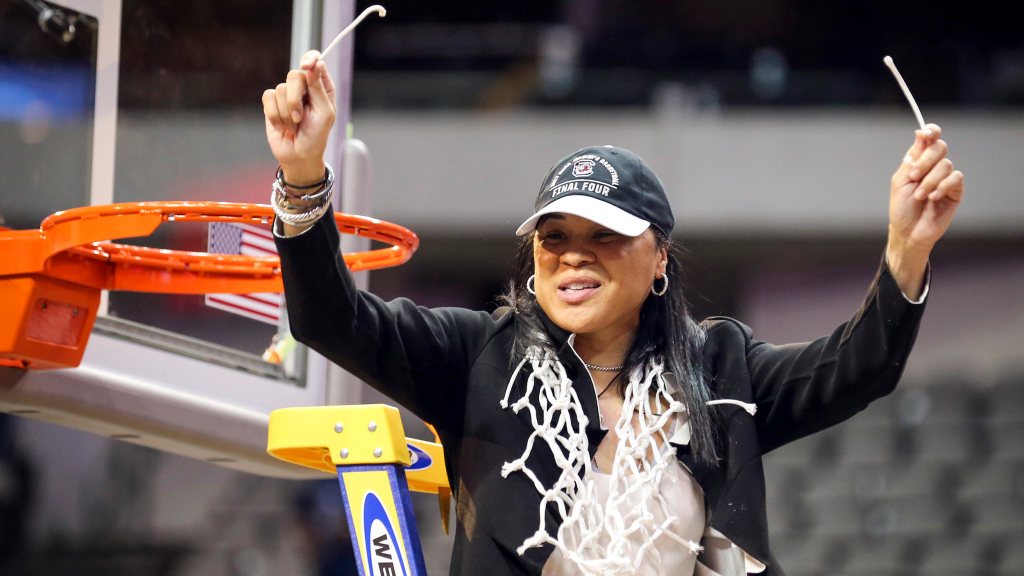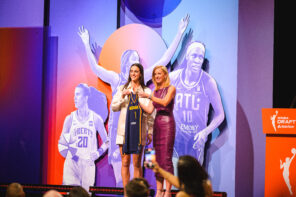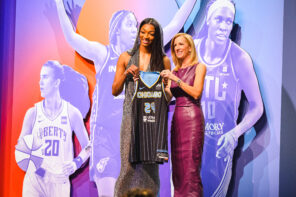In the coaching landscape of women’s basketball – some coaches seem to simply get it. Yeah, there are the Kim Mulkeys of the world at LSU who make themselves difficult to cheer for, but for every Kim Mulkey there is a Dawn Staley.
The pride of Philadelphia and current head coach at the University of South Carolina, Staley understands how important she is to women’s basketball being a successful Black woman coach.
Recently – Staley made a symbolic move to show that she gets it when she bestowed a piece of the championship net from the 2017 national championship with other Division I Black women coaches.
Among those Black women coaches? Adia Barnes at Arizona and Marisa Moseley at Wisconsin.
@dawnstaley I love this…THANK YOU! pic.twitter.com/ShBA27S6TZ
— ADIA BARNES COPPA 🐻⬇️🌵👨👨👧👦❤️💙 (@AdiaBarnes) November 11, 2021
As we kick off this new season… wanted to send a huge thank you to @dawnstaley for this awesome gift of a piece of her championship net!! Def something to aspire to! Good luck to all and stay healthy#onwisconsin pic.twitter.com/93E5Tm1KSK
— marisa moseley (@marisamoseley) November 10, 2021
Staley is fulfilling a promise made from when Carolyn Peck won a national championship with Purdue in 1999. Sixteen years later in 2015, Peck gave Staley a piece of that championship net as long as Staley fulfilled a promise to pass the net after she won her first championship.
With the Gamecocks of 2017-18 led by A’ja Wilson, the eventual first-overall draft pick that season by the Las Vegas Aces, South Carolina became national champions and Staley made more history.
Staley fulfilled that promise in a major way.
Staley has continued to prove that throughout her years, she understands the assignment – and not simply as South Carolina’s coach. She understands that given where South Carolina’s women’s basketball program currently is that she is a standard-bearer for other Black women coaches throughout women’s basketball – in either pro or college.
When she wins, or win Barnes wins at Arizona or when Georgia women’s basketball coach Joni Taylor (wife of Atlanta Dream assistant general manager Darius Taylor) wins, Black women win across the board.
Basketball has had a diversity program within its coaching ranks for decades – and even the WNBA, as diverse as its players are, is not immune to this issue (even though it is on the improve).
Noelle Quinn of the Seattle Storm, Vicki Johnson at the Dallas Wings and the Dream’s Tanisha Wright are the three Black women head coaches in the W. There are two Black men who are also head coaches in Derek Fisher at the Los Angeles Sparks and James Wade at the defending WNBA champion Chicago Sky. Sandy Brondello (Phoenix Mercury), Cheryl Reeve (Minnesota Lynx) and Marianne Stanley (Indiana Fever) are other women head coaches within the WNBA’s ranks.
Staley’s status as a standard-bearer for other Black coaches is in large part to how she has changed the game by changing the culture. When Staley first arrived on the scene at South Carolina, it was not a much-ballyhooed women’s basketball program. Her changing the culture in Columbia has led to the Gamecocks becoming one of the most respected programs in the country, constantly in the conversation for which team will win the national championship.
When a team wins as much as Staley does, that does wonders for a program’s recruiting. There is a reason why Staley’s name constantly comes up whenever coaching openings in either the WNBA or the NBA open up. Also, Staley’s status as being a gold medal-winning coach with USA Basketball, as was the case at this year’s Tokyo Olympics, only makes her even more of a standard-bearer for Black coaches.
South Carolina has become a WNBA factory under Staley – and Columbia’s Colonial Life Arena has arguably the most raucous in-game atmosphere of any women’s basketball venue in the nation. That is why her gesture to send a piece of her championship net, a symbol of her and South Carolina’s success, is no small gesture. It proves that Staley is well-aware of the climate of women’s sports and why Black coaches need to rally around each other.
Oh – and not only that, Staley was recently rewarded by South Carolina for everything that she has done with a new 7-year, $22.4 million contract. Staley is now paid more by the Gamecocks than its football coach, Shane Beamer, is paid.
Inject that into the veins of every NCAA college program in the country.
There are some coaches who simply live in a vacuum and only relate things back to their team and their program. Staley understand that it cannot be her as a Black woman coach and it cannot be other Black woman coaches in the NCAA. Programs preach the idea of their programs being sisterhoods. This is true of those programs – as well as the Black woman coaching fraternity within women’s college basketball – and women college sports.
THIS! Incredible exchange between the visionary behind #pieceofthenet. Thx @CAROLYNPECK for your vision and belief #nationalchamps #whosnext pic.twitter.com/PAarcVk3nk
— dawnstaley (@dawnstaley) April 29, 2017
When Staley’s Gamecocks won the national championship, she hashtagged “Who’s Next” in that celebratory tweet honoring Peck’s vision of when she won at Purdue. Peck was the first Black woman coach to win a national championship when she won with the Boilermakers and is currently an analyst with ESPN and SEC Network.
The question now applies to the current slate of Division I Black woman coaches – who’s next?




